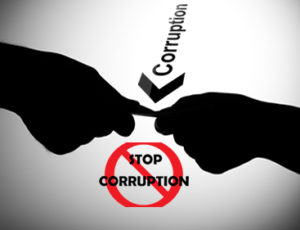Corruption thrives in times of crisis – GII
 Various risk assessments undertaken on COVID-19 interventions globally, by Transparency International and many development partners have pointed to the fact that the pandemic has a disastrous effect on anti-corruption efforts.
Various risk assessments undertaken on COVID-19 interventions globally, by Transparency International and many development partners have pointed to the fact that the pandemic has a disastrous effect on anti-corruption efforts.
According to the Ghana Integrity Initiative (GII), Governments in attempts to curtail the spread of the pandemic took drastic decisions on life-saving measures, as a result, overlooking laid down principles, rules, and regulations of procurement, such as verifying suppliers or determining fair prices.
“It is in that regard that it became critical to interrogate the resilience of the various policy measures the Government of Ghana has initiated to alleviate the impact of COVID-19 on the nation, in order to integrate anti-corruption measures in COVID-19 recovery efforts,” Mrs Mary Awelana Addah, GII Programmes Manager, has stated.
Mrs Addah, who presented the recommendations during the launch of the GII Corruption Risk Assessment (CRA) explained that it was against this background that GII conducted the corruption risk assessment to evaluate the risk of corruption in the government’s interventions.
The assessment was also to identify the systems in place to mitigate the risks of corruption and gaps that exist in the systems as well as best practices with the view to making proactive recommendations for corrective actions and to guide future Government response in similar situations.
According to the GII assessment, the government has been transparent and disseminated information through weekly press conferences and presentation of appropriation accounts to Parliament, creating the illusion of citizen involvement, but real decision-making regarding procurement contracts has been opaque.
Mrs Addah explained that the overall governance risk is medium, with a high risk in integrity mechanisms, indicating that rules, regulations and standards have not been adequately complied with.
She said the assessment raises red flags in the areas of integrity, accountability, and participation.
“Problems are mainly related to issues of accountability, the application of rules and procedures, and low levels of participation of independent governance and accountability institutions and beneficiaries in decision-making around public procurement.
“High-risk areas are predominantly around the procurement of goods and services for the various interventions,” she said.
The GII Programme Manager said the assessment also uncovered the risk of corruption in the relations between the Central Government (which seems to have awarded all contracts) and suppliers who were mainly sole-sourced.
“This risk derives from the absence of appropriate mechanisms to regulate these relations or the failure to consistently apply such mechanisms where they exist,” she said.
Mrs Linda Ofori-Kwafo, GII Executive Director acknowledged the support of the Centre for International Private Enterprise (CIPE) particularly Ms. Carmen Stanila, who is a Senior Consultant at CIPE, who supported GII during the implementation of the project.
Ms Stanila also made commendation to GII for the work and hoped the recommendations would be considered for implementation to serve as a best practice in similar situations.
The Corruption Risk Assessment report on the government’s COVID-19 interventions was launched by GII captured views of over 3000 respondents including citizens who were also beneficiaries of the COVID-19 interventions, public stakeholders, and the private business.
Source: GNA
